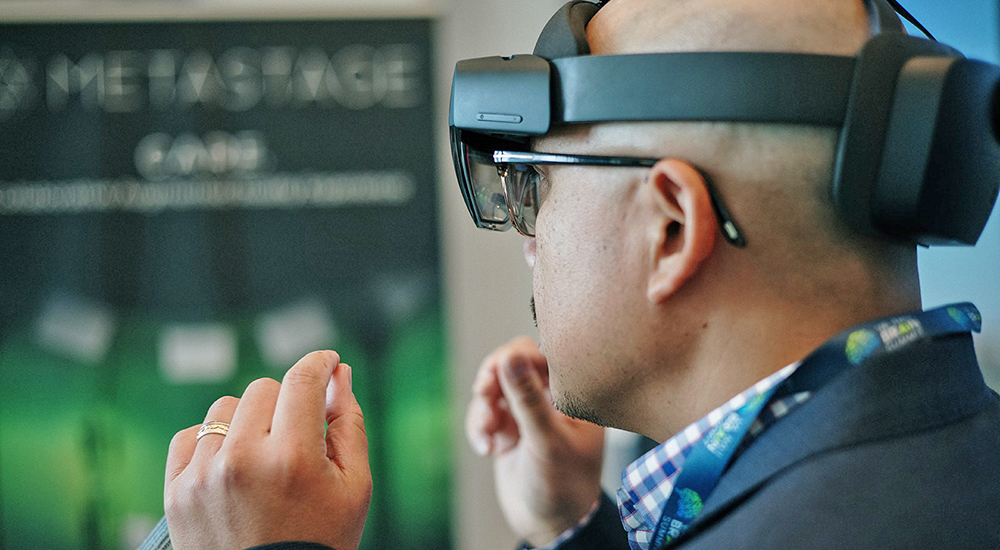Preventing Veteran suicide is VA’s top clinical priority. Mission Daybreak is a $20 million grand challenge to reduce Veteran suicides. It’s part of VA’s 10-year strategy to end Veteran suicide through a comprehensive, public health approach.
Thirty finalists in VA’s Mission Daybreak presented their suicide prevention solutions at Demo Day, an in-person showcase event Nov. 4.
Twenty-three of the finalist teams include a Veteran or Veteran family member. Their solutions range from early-stage concepts to market-ready tools and programs, across focus areas:
- Four (13%) finalist solutions address lethal means safety.
- Eight (27%) seek to integrate with or build off the Veterans Crisis Line.
- Five (17%) utilize extended reality solutions.
- Additional solution concepts use artificial intelligence and machine learning to better identify and care for Veterans in crisis.
Finalists presented to judges at Demo Day
During Demo Day at the Samsung Executive Briefing Center, finalists had the opportunity to speak about their solutions with challenge judges and representatives from VA, VSOs and policy institutes. The judges bring a diversity of perspectives and experiences, from Veterans and clinicians to social workers and technical experts. Amazon provided additional support for the event.
Dr. Matthew Miller, executive director for VA Suicide Prevention, discussed how the challenge is inspiring unique suicide prevention solutions specifically designed for Veterans to drive real impact in addressing this health crisis.
Diverse range of suicide prevention solutions for Veterans
Suicide has no single cause and no single strategy can end this complex problem. To be effective, prevention solutions must meet individuals where they are instead of a one-size-fits-all approach.
To address the many causes of suicide, Mission Daybreak called for innovative solutions across a range of focus areas. VA received more than 1,300 concept submissions from Veterans, VSOs, community-based organizations, health tech companies, startups and universities in its effort to help transform the way the country addresses suicide.
Mission Daybreak announced the 30 finalists advancing to the Phase 2 virtual accelerator program in September. The finalists’ solutions range from technology-enhanced lethal means safety concepts to extended reality interventions, offering the potential for healing and recovery to Veterans.
Virtual accelerator program finalists advance and refine solutions
Leading up to Demo Day, finalists participated in a virtual accelerator program designed to help them develop ambitious but achievable roadmaps for prototyping, iteration, testing and evaluation.
The accelerator helped finalists strengthen their solutions to better reach and serve Veterans through:
- Webinars, panels and Q&A sessions;
- Mentorship;
- Technology partner support;
- Exclusive data sets;
- Networking opportunities;
- Pitch prep.
Mission Daybreak to award $11.5 million
Phase 2 will award $11.5 million in prizes: Two first-place winners will each receive $3 million, three second-place winners will each receive $1 million, and five third-place winners will each receive $500,000.
Following the challenge, VA may engage with select solutions through contracts, Cooperative Research and Development Agreements or other partnership vehicles.
To learn more, visit missiondaybreak.net and subscribe to the challenge newsletter.
Topics in this story
More Stories
At 79, Douglas B. Hatch was paralyzed by Guillain-Barré syndrome. Now 83, he’s training to compete in the National Veterans Wheelchair Games.
VA delivers the care you have earned—whenever and wherever you need it.
Face it, muscle tension is not good for your health, but you can do something about it in 15 minutes!







Couldn’t you spend that money properly staffing and training the existing workforce?
If the current system isn’t working, adding more poorly executed programs won’t help.
How about a Euthanasia Clinic for the old PTSD Vietnam Vets. It’s not a life worth living only to exist while waiting for the clock to run out, just getting by living on the fringes of a society that views us as like a bad memory. This would be a favorable solution for the entrenched conservative bean counters in the VA’s upper ranks. When the next GOP Congress takes over the Veterans Committee the VA can go back to its tried and true policy of “delay, deny and wait for them die”, all they had to do was stall until the tide changed.
11.5 million dollars of waste instead of using existing resources properly with some common sense. The VA Crisis Line needs to stop with out dated suicidal assessment questions being efficient at checking boxes but not digging deeper and connecting with the Veteran something some of the counselors do naturally. Takening the time to let the Veteran vent without cutting them off to get to your ineffective check boxes. Years as a Psych RN seeing the same questions asked in monotone sounding voice thinking a suicidal Vet is always going to say yes. I’ve seen it too many times answers are no but they go home shoot their self in the head, jump off a bridge, overdose.
Suicide Prevention Consults should be intiated only after more indepth conversation so Coordinators aren’t overwhelmed and end up just checking a box too. Call Veteran chat a little check the box. Sometimes they don’t even call because there is no oversite and acountability. Some of these people that call all ready have an angry tone and will write a defamatory note about the veteran weaponizing psych jargon.
Veterans are suicidal about something. How about problem solving. Many times it is about the care they aren’t getting at the VA for their mental health and physical health. The mind and body are one. Use your instant messaging platform to help solve problems with decision makers. Yes it may take more time but takening the time now is going to reduce your work load with repeated calls.
Looping in the Veterans Mental Healthcare Team AND Primary team isn’t done. They never here about or if they do they don’t care. You get a call from a coordinator from the parent facility in my case and it never goes beyond that. The Veteran literally has to pusj the envelope and continual make these consults, call the VA Washington Hotline, go to the medical director, Admin, Chiefs to get movement because staff are petrified of doing this like many Advocates who should also be looped in on the process. Everybody working as a team to solve a problem and actually do something is focusing on being effective rather than efficient in checking boxes over and over.
Advocates should be on the drop down menu of every Veteran on HealtheVet. Chaplains are there. Why not Advocates? Then there is a record of what was said and done with accountability in problem solving.
The Advocates I’ve called had to be pushed to the brink to finally do something and others sit in their offices coming up with rationalizing why they can’t do A B or C forcing to do it yourself. The good Advocates usually Veterans get alienated by their bosses.
Invest more time in actually making the VA work vs marketing we did this and that in your newletter and stop sabatoging Community Care acess being short sighted, You should be thanking Community Care providers for picking up the slack. We need more email surveys in VA healthcare by 3rd party providers with results posted publically with no control over the 3rd party to force them to cherry picking. I know it is going on. You fill a survey out for a department that is doing great job and amazingly you get surveys on every interaction.
The VA Healthcare system is the cause of many of these suicides to put it bluntly. The VA to save itself in the long term needs to be completely opposite of what they are which means pure transparency that all Veterans can see posted and accountability meaning the ability to fire people. It’s not only people but processes that need to be streamlined with modern technology with legislation for 3rd party consultants to come in long term with no affiliations with the VA and start analyzing what needs to change, what is working and what needs to go and any policy against it instantly discarded or adjusted.
If VA Healthcare doesn’t do this starting yesterday someone will. Your empire and that’s the way we have always done it is not going to keep working for ever. Also we need many more Veteransin decision making positions.
If data collected by a unbiased third party was posted easy for Veterans to digest without trickery on performance data accross the VA showing major improvements maybe Veterans would want to use the VA instead of Community Care undoing the years of horror stories which is going to take time and effort and pride.
Community Care providers need to be assessed by Veterans via email surveys AFTER treatment is completed.
Yes I went on a tangent but all of these problems in VA Healthcare is driving Veterans insane.
Garbage. Where is family support services for chronic illness, what about timely claims, how about good medical care? Why aren’t those top 3?